
HELPING FOSTER
CHILDREN IN SCHOOL
by the same author
The Foster Parenting Manual
A Practical Guide to Creating a Loving, Safe and Stable Home
John DeGarmo
Foreword by Mary Perdue
ISBN 978 1 84905 956 5
eISBN 978 0 85700 795 7
Love and Mayhem
One Big Familys Uplifting Story of Fostering and Adoption
John DeGarmo
ISBN 978 1 84905 775 2
eISBN 978 1 78450 012 2
A Different Home
A New Foster Childs Story
John DeGarmo and Kelly DeGarmo
Illustrated by Norma Jeanne Trammell
ISBN 978 1 84905 987 9
eISBN 978 0 85700 897 8
Keeping Foster Children Safe Online
Positive Strategies to Prevent Cyberbullying, Inappropriate Contact, and Other Digital Dangers
John DeGarmo
Foreword by Irene Clements
ISBN 978 1 84905 973 2
eISBN 978 0 85700 862 6
of related interest
Educating Children and Young People in Care
Learning Placements and Caring Schools
Claire Cameron, Graham Connelly and Sonia Jackson
ISBN 978 1 84905 365 5
eISBN 978 0 85700 719 3
The Teachers Introduction to Attachment
Practical Essentials for Teachers, Carers and School Support Staff
Nicola Marshall
Foreword by Phil Thomas
ISBN 978 1 84905 550 5
eISBN 978 0 85700 973 9
Observing Children with Attachment Difficulties in School
A Tool for Identifying and Supporting Emotional and Social Difficulties in Children Aged 511
Kim S. Golding, Jane Fain, Ann Frost, Cathy Mills, Helen Worrall, Netty Roberts, Eleanor Durrant and Sian Templeton
ISBN 978 1 84905 336 5
eISBN 978 0 85700 675 2
HELPING
FOSTER CHILDREN
IN SCHOOL
A Guide for Foster Parents, Social Workers and Teachers
JOHN DEGARMO
FOREWORD BY HAROLD SLOKE

Jessica Kingsley Publishers
London and Philadelphia
First published in 2015
by Jessica Kingsley Publishers
73 Collier Street
London N1 9BE, UK
and
400 Market Street, Suite 400
Philadelphia, PA 19106, USA
www.jkp.com
Copyright John DeGarmo 2015
Foreword copyright Harold Sloke 2015
Front cover image source: iStockphoto. The cover image is for illustrative purposes only, and any person featuring is a model.
All rights reserved. No part of this publication may be reproduced in any material form (including photocopying any of the pages other than those marked with a , or storing it in any medium by electronic means and whether or not transiently or incidentally to some other use of this publication) without the written permission of the copyright owner except in accordance with the provisions of the Copyright, Designs and Patents Act 1988 or under the terms of a licence issued by the Copyright Licensing Agency Ltd, Saffron House, 610 Kirby Street, London EC1N 8TS. Applications for the copyright owners written permission to reproduce any part of this publication should be addressed to the publisher.
Warning: The doing of an unauthorized act in relation to a copyright work may result in both a civil claim for damages and criminal prosecution.
All pages marked  may be photocopied for personal use, but may not be reproduced for any other purpose without the permission of the publisher.
may be photocopied for personal use, but may not be reproduced for any other purpose without the permission of the publisher.
Library of Congress Cataloging in Publication Data
DeGarmo, John, 1969
Helping foster children in school : a guide for foster parents, social workers and teachers / John
DeGarmo.
pages cm
Includes bibliographical references and index.
ISBN 978-1-84905-745-5 (alk. paper)
1. Foster children--Education--United States. 2. Children with social disabilities--Education--United
States. 3. Youth with social disabilities--Education--United States. 4. Foster children--Services for-
United States. I. Title.
LC4091.D44 2015
371.82694--dc23
2015002889
British Library Cataloguing in Publication Data
A CIP catalogue record for this book is available from the British Library
ISBN 978 1 84905 745 5
eISBN 978 1 78450 162 4
For Brandon, Garret, and Preston; three brothers who came to live with me, and reminded me of the importance of education for all children in foster care.
Train a child in the way he should go, and when he is old he will not turn from it.
Proverbs 22:6
CONTENTS
Foreword
Harold Sloke
I wake up in the middle of the night to a smack across my face. I then feel my eight-year-old body flying across the room. My mother is screaming and pleading with my stepfather to stop. He picks me up by my throat and proceeds to tell me I will turn out to be a failure just like my father. Shut up, woman! he yells as he slaps her across the face. You want a reason to cry??? Ill give you a reason to cry! He then goes into the other room to grab his 12 gauge shotgun. He tells me to get on my knees and he puts the gun to my head. Heres your reason to cry. Hes better off dead anyway, he tells my mother. The only question I can ask myself is what can save me? Will it be like this forever?
My early childhood was the scariest time of my life. Not necessarily because of the abuse, but because of the uncertainty of my future. My mother and stepfather would often tell me about their own childhood horror stories, as they were both abused and neglected also. All I knew was that I didnt want to repeat that cycle. But what could save me? I did not have that answer during that time. Instead, I read whole sets of encyclopedias and my Bible over and over again as I was nailed shut into my room. My meals were given to me underneath my door. I missed many days of school because they did not want others to see the bruises. I hoped that better days would come. What could possibly save me?
When I entered the foster care system at the age of 13, I was already involved with the juvenile justice system. I joined a gang for protection and for a sense of family. I was certainly aware that I was not heading down the right road, but at the moment I did not care. I was free from the abuse of my mother and stepdad. Instead, I found myself in a new type of hell. Before I aged out of the foster care system at the age of 18, I had been in over 30 foster homes, group homes, and juvenile placements. This resulted in me attending 12 high schools. With each school move, my credits failed to transfer. I found myself repeating ninth grade for the third time. On my second day in my eleventh high school, I laid my head on my desk in my keyboarding class. I was feeling quite depressed that day and my teacher, Karen Parker, noticed it. She asked me what was wrong and I told her a little about my situation. She genuinely seemed to care, so I slowly told her more. She was shocked that I was still in the ninth grade and that none of my credits had transferred. She advocated on my behalf until I received enough credits to almost be in the eleventh grade. I eventually graduated high school at the age of 19 with a 1.8 GPA. The Grade Point Average ranges from 0.0 to 4.0, so a 1.8 GPA is considered pretty low.
I joined the Army Reserves after graduation and went off to active duty for about a year. When I returned, I enrolled into a community college since I could not get into a university with such a low high school GPA. In 2012, I applied and was accepted to the Congressional Coalition on Adoption Institute Foster Youth Internship. As a part of the internship, I had to write a policy report on how I would change the foster care system. I wrote about my educational experience in high school where my credits were not transferring over. My policy report transformed into the Uninterrupted Scholars Act, which amended the Family Educational Rights and Privacy Act to allow social workers to access foster childrens educational records with each school transition in a timely manner. My story was featured nationally in the media. I worked on Capitol Hill for a while as a legislative aide. I never imagined during my childhood that I would make such a profound difference in others lives.
Next page
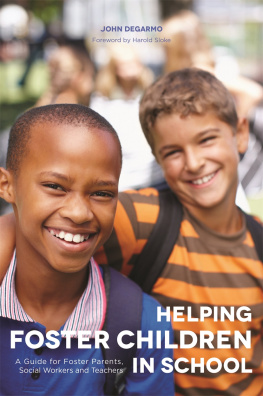
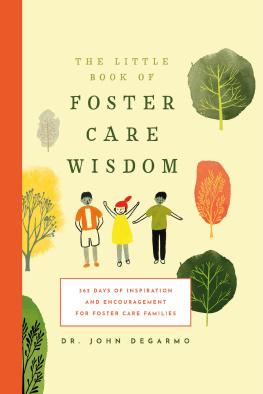

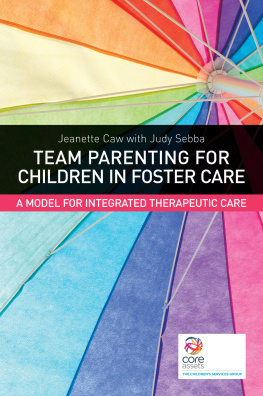

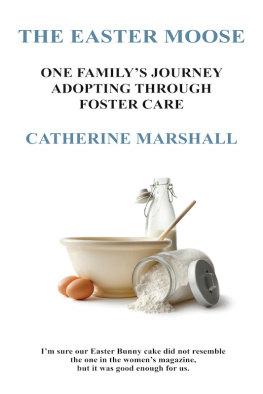
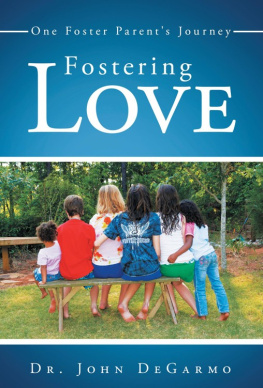
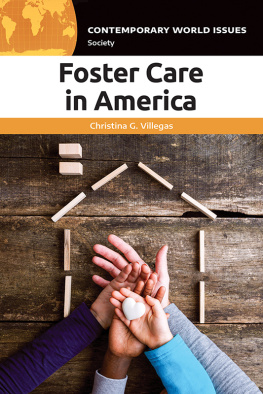
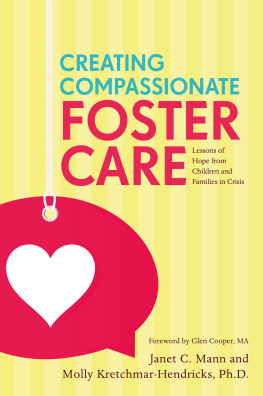
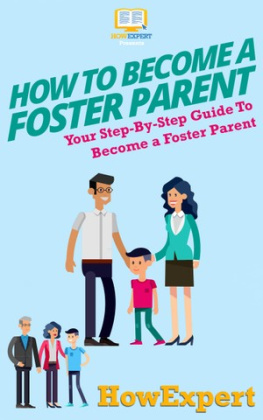


 may be photocopied for personal use, but may not be reproduced for any other purpose without the permission of the publisher.
may be photocopied for personal use, but may not be reproduced for any other purpose without the permission of the publisher.